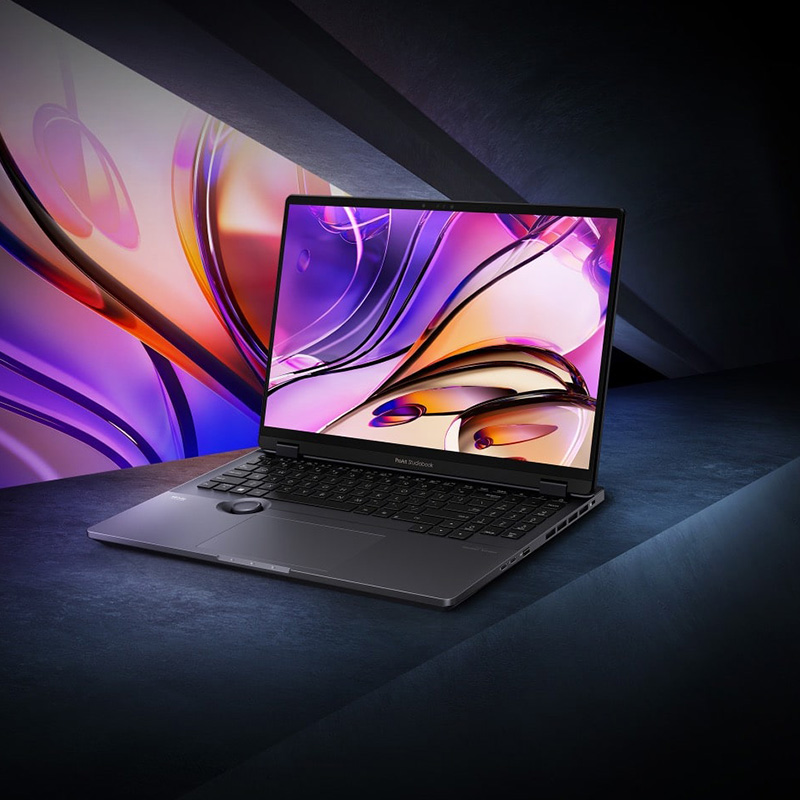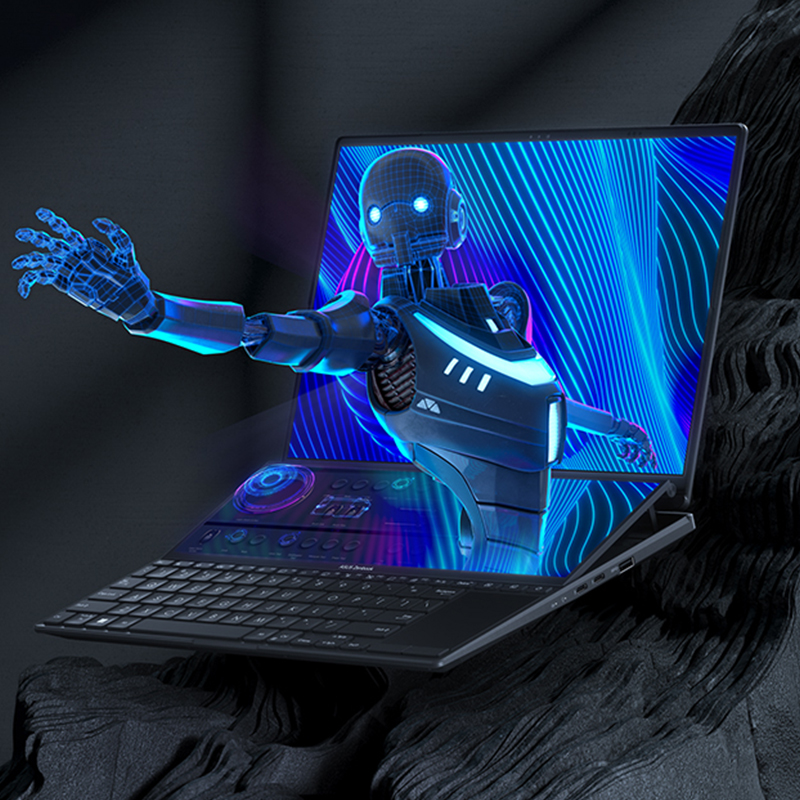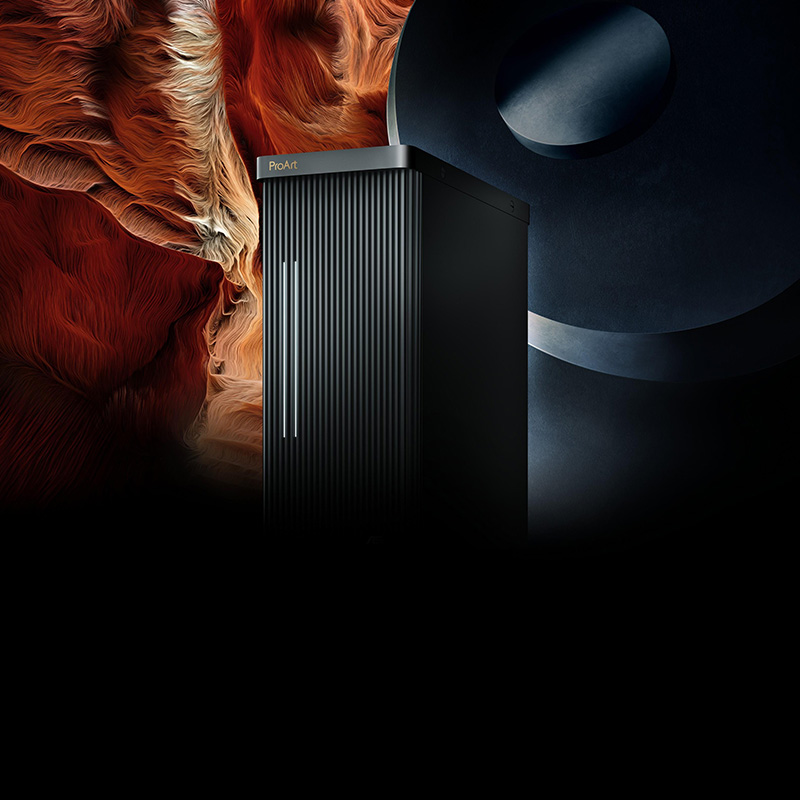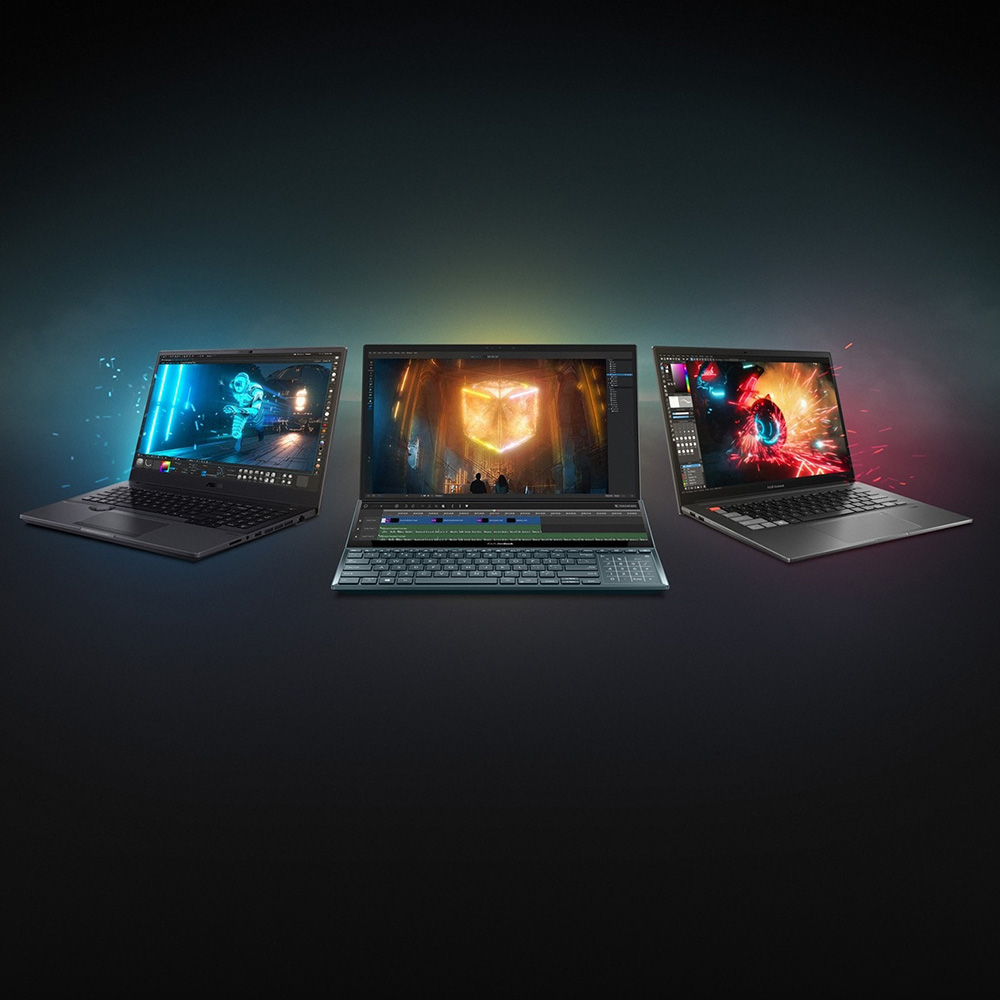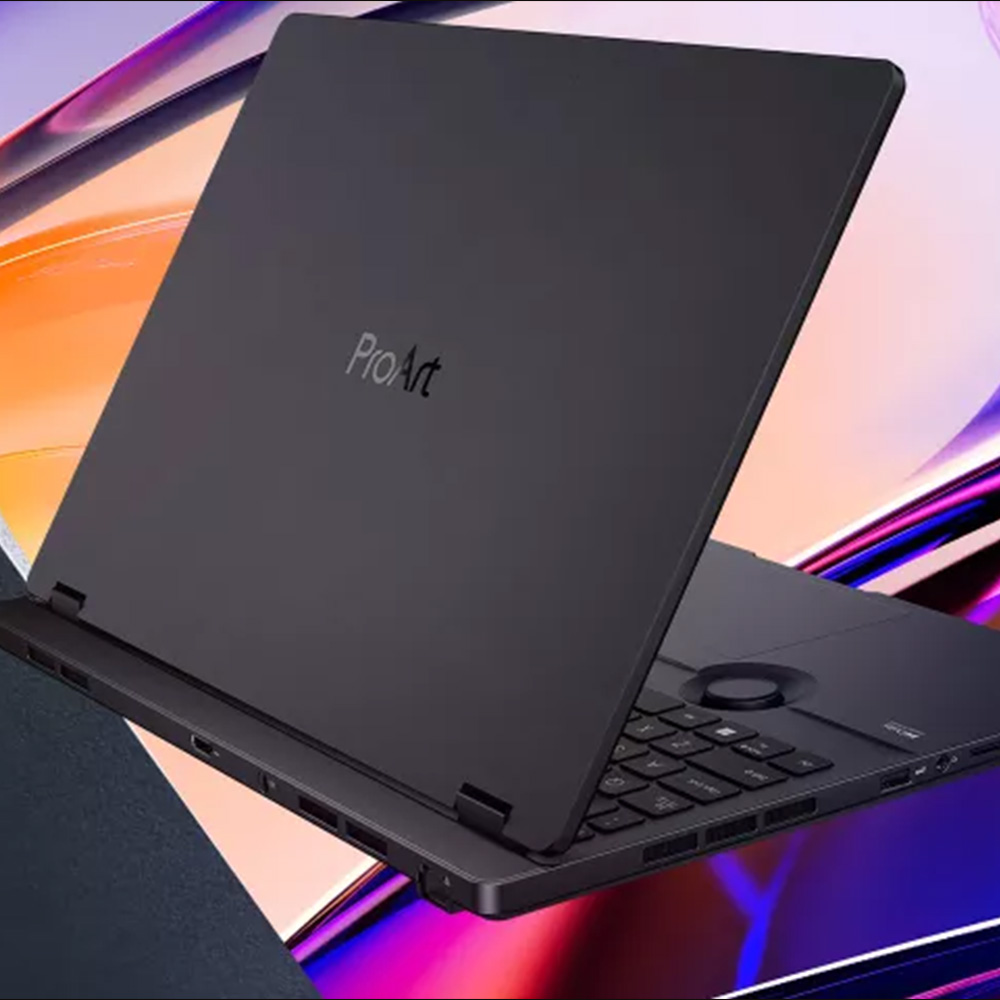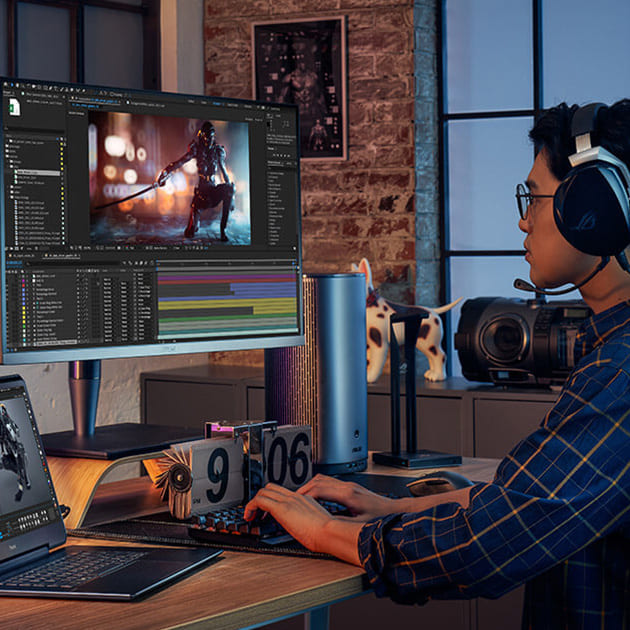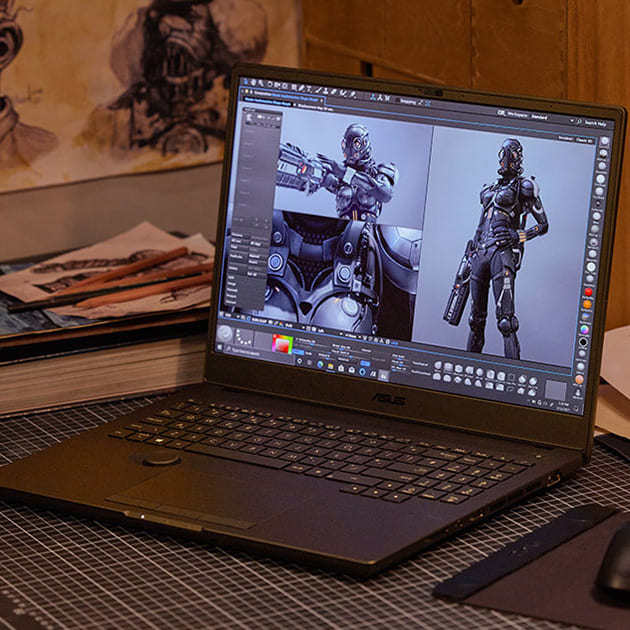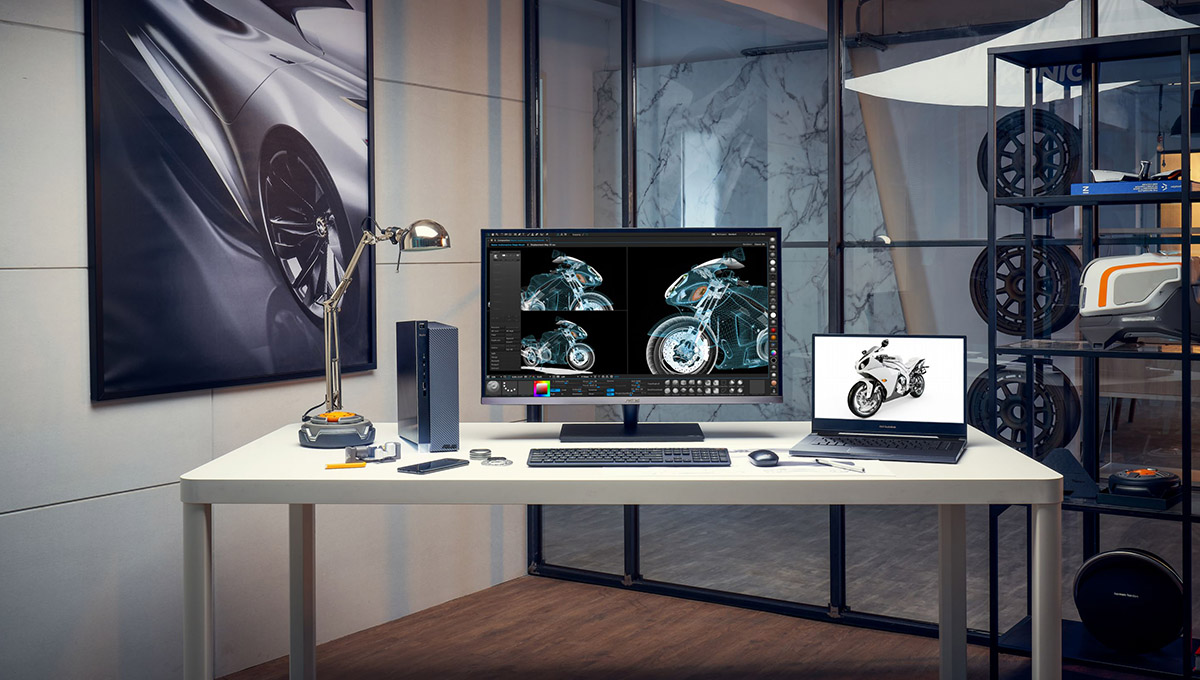
Jun 15, 2023
When today’s content creators choose their next computer, they often
wonder if they should get a desktop or a laptop. With the emergence
of creator laptops, the choice for content creators is no longer
limited to powerful desktops. This guide will lay out the advantages
of both desktops and laptops, as well as other considerations to
keep in mind when deciding which option is best for meeting
individual needs.
Advantages of a Desktop for Content Creators
A desktop computer can be a great choice for some content creators,
especially if they usually work at a dedicated space at home or in
an office or studio. Below are some advantages of desktops.
Peripherals & I/O Ports
A key advantage of desktops is the plentiful I/O port availability,
which enables extensive connectivity.
Many content creators need a number of peripherals to help them work
efficiently, especially if using a multiscreen setup. For desktop
users, a keyboard and a mouse, as well as an audio system of some
kind―be it speakers or headphones―are essential.
ASUS offers dedicated ProArt mouse with a special ASUS Dial design
that allows users to streamline their creative workflows with
precision. It also features an independent middle button, especially
useful while working on 3D designs.
To accompany the mouse, we also offer a ProArt Mousepad which allows
precise and comfortable control. It features a magnetic side area
and leather top that help organize your accessories. In addition,
this unique mousepad comes with an 18% grey card, giving
photographers reference point at a glance.
Other peripherals frequently used by creative professionals include
a pen tablet, a control station with a dial to help operate creative
software (unnecessary for ProArt Mouse users), and some sort of
solution that helps connect comfortably.
No Battery Concerns
Desktops are always connected to a power source, so you’ll never
have to worry about battery life. Why is that a concern?
Content creators need to render their work after completion.
Rendering can be a power-intensive and time-consuming task,
especially with 3D work or video. Therefore, many creative pros
render their work overnight. With a desktop, power is always
connected―so there is no chance of forgetting to plug in the
machine, as can be the case with a laptop. For users rendering on a
laptop, power loss during a render may result in issues that can
cost time and money.
With an always-connected desktop, you won’t see this happening,
unless you face a power outage. If this is a frequent occurrence
where you live and work, you may want to invest in an
uninterruptable power supply (UPS).
Upgradable
Desktops are built with independent parts―components―that can be
changed at any time. If you wish to upgrade a part, it’s usually
easy to do―as long as the part is compatible with your computer’s
motherboard and fits into the case.
This is important, because the initial cost can be lower as your
first build may be made with lower-grade parts, and then you can
upgrade parts over time as needed.
In the long term, having an easily upgradeable machine can help save
money—when you need more power, you can simply purchase a new
component instead of needing to upgrade the whole computer.
Also, building a PC can be a satisfying, fun thing to do, and you
can customize your machine aesthetically to suit your style.
Other Considerations to Keep in Mind When Choosing a Desktop for
Content Creators
Limited Portability
Desktops are not very portable, and require peripherals to be able
to work. Likewise, portability is an issue for content creators who
travel often or need to work from multiple locations.
Take Space
Desktops and necessary peripherals require space.
Desktops also need to be situated in a proper way (not on the
floor), to avoid damage or overheating. When deciding on the
placement of your computer, pay attention to easy access to the rear
I/O ports. Most computer desks have access slots that make it easy
to route the wired permanent peripherals to ports.
Here are a few more
tips for organizing a creator workstation
DIY Upgrades and Building Are Difficult
As mentioned previously, one of the advantages of a desktop is the
ability to upgrade virtually any part. Building a machine from
scratch can also be an enjoyable project. But there are challenges
to upgrades and new builds, including compatibility and ensuring
adequate cooling.
For those who don’t want the challenge of upgrades or building new,
pre-built options such as the
ASUS ProArt Station PD5
are a good solution.
Advantages of Laptops for Content Creators
An attractive alternative to a desktop has become available in
recent years. Today, content creators can purchase a
high-performance laptop built specifically with their needs in mind.
Below are some key ideas to keep in mind when considering the option
of a laptop.
Portability
Laptops are made to be portable. This means that you can slip your
creator laptop into a backpack and work from virtually anywhere.
While not quite as slim and light as some ultraportable consumer
laptops, creator machines are powerful and many weigh less than 2.5
kg.
Unique features enable work on the go
ASUS builds creator laptops in a way that allows you to work
completely free of peripherals if you so choose.
Each ASUS creator laptop offers a robust CPU and graphics, plus a
user-friendly keyboard, mouse and display screen, and other input
options. Some laptops such as the
Zenbook Pro 14 Duo OLED
feature two touchscreens, enabling exceptional workflow and
multitasking.
Most ASUS creator laptops support stylus input as well.
A unique ASUS feature that creators find very useful is the ASUS
Dial, a convenient rotary input device placed next to the
touchpad—or embedded in one in case of DialPad—that facilitates easy
manipulation of creative software features. This feature is
compatible with Adobe Photoshop®, Premiere Pro®, Photoshop Lightroom
Classic®, After Effects®, and Illustrator®, as well as Microsft 365
apps, entertainment software, and Internet browsers Color-accurate
2.8K OLED displays with 120 Hz or higher refresh rates in ASUS
creator laptops offer incredible visuals. These high-quality
displays mean you won’t need an expensive professional monitor to
see your work accurately.
These laptops also have a full set of I/O ports. And if you need to
plug in more when stationary, you can always purchase a docking
station.
Plenty of Power
The computing power in ASUS creator laptops can go toe-to-toe with
many desktops. For instance, the
ProArt Studiobook 16 OLED
comes with up to an Intel® Core™ i9- 13980HX multicore processor
with up to 5.6 GHz with Turbo Boost and up to NVIDIA® GeForce RTX™
4070 dedicated GPU. The discrete graphics card allows your computer
to handle heavier graphics-related tasks and frees up CPU power.
The ProArt Studiobook 16 OLED offers 64 GB of memory with two
SO-DIMM slots for upgradeability, so you can count on
responsiveness, even when handling heavy tasks. You can also choose
up to high-performance 4 TB + 4 TB M.2 NVMe™ PCIe® 4.0 Performance
SSD storage.
Other Considerations to Keep in Mind When Choosing a Laptop for
Content Creators
Battery life under heavy workloads
A dedicated GPU provides much more computing power when handling
graphical tasks, but it also requires more power than an integrated
graphics card. This will eat into how long the battery can last.
In addition, even the most powerful batteries can see the time
between charges shrink significantly when handling heavy tasks like
video editing or 3D design.
If you use creative software on the go, always remember to bring a
charger with you, and save your work frequently to avoid losing your
progress due to your laptop turning off as a result of low battery
charge. You may also want to consider a laptop power bank like the
ZenPower Pro
for emergency charging.
Upgrade limitations
Laptops are not as easily customizable or upgradeable as the
desktops. While components such as SSD or RAM can be added via
available upgrade slots, some parts like CPU or GPU simply cannot be
changed.
That means that if you “outgrow” your laptop’s capabilities, you may
need to upgrade to a new machine.
One solution to this is purchasing a machine more powerful that what
you currently need, but that may require increasing your budget.
If you’re wondering how to ensure you have a powerful-enough laptop
for content creation, we offer
a short guide to creator laptop specs
Verdict: Dedicated Creator Laptops are a Good Solution for Most
Users
LAPTOP
Advantages
- Easy portability allows work on the go
-
Dedicated creator tools and features preclude need for
peripherals
-
Powerful enough to handle fairly heavy work, even when on
the go
Potential Disadvantage
-
Decreased time between charges as compared to laptops with
integrated GPU
- Heavy workflows quickly drain battery
- Certain important components cannot be upgraded
DESKTOP
Advantages
- Plentiful I/O ports for peripherals
- Always powered; no battery concerns
- Upgradable and customizable
Potential Disadvantage
- Best for stationary work; require peripherals
- Require a dedicated, larger space
- DIY upgrades require knowledge and expertise
Optimally, you’d have a desktop for when working at the desk, and a
laptop for working on the go. However, if you need to settle for
just one computer, we believe that a laptop specifically made for
content creators may be your best option.
That said, for heavy creative work (such as intensive 3D renders), a
desktop may be a better way to go.
Versatility and mobility are, however, very important for many
users, and these can be achieved only with a laptop. Thanks to new
powerful laptop processors and dedicated creator tools such as the
ASUS Dial, working on the go no longer means making a compromise on
your choice of device.
Even for many advanced creators doing heavy work such as 3D design
or video rendering, laptops can still be a good option. You can use
a powerful
ProArt Studiobook 16 OLED, even on the go—just remember to ensure your laptop doesn’t turn
off.
If you so prefer, when stationary, simply dock it at your desk and
treat it as a desktop PC, plugging in peripherals as needed. Then,
if a time comes when you want to work on the go, you will appreciate
its portability.
Discover ASUS Creator Laptops







